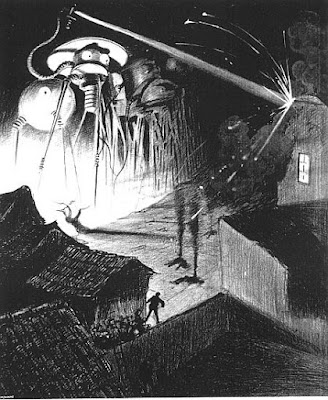 |
| Brazilian artist Henrique Avim Correa's illustration for a 1906 edition of Wells's War of the Worlds. Photo Credit: Henrique Avim Correa/Wikimedia Commons |
I said I’ve been wanting to discuss minorities of colour in
speculative fiction and what prompted me to do that was this really interesting
article entitled “Will It Get Better for Black People In the Horror Genre?” at Blackgirlnerds.com. The author, Valerie Complex, talks about how blacks are often portrayed poorly
in horror. She says if they don’t play in stereotypical roles such as maids, janitors
and gangbangers in film and television then their characters often get killed
off early.
I read Complex’s article just after I saw Jurassic World last month, which was a
good enough movie considering that it was a popcorn flick. But the article
reminded me how annoyed I was with the movie for its treatment of characters of
colour because what happens to them is the exact sort of thing Complex talks
about: many are killed off early or, if not killed off, they disappear near the
end of the movie where you never hear about them again and so make no
contribution to the concluding scene. And these are not just cameo or small
role characters but are the more significant characters more directly involved
with the plot. So the producers were apparently sticking to this age-old set of
tropes that do not work for today’s movies considering how far we’ve come in
issues of race. And this is a movie that was made by a person of Semitic
background: Steven Speilberg who’s Jewish. You would think he would bear in
mind the problem with weak characters of colour which stereotyping contributes
to a lot.
I’m reading my first James Bond novel, Doctor No, and, as good as the story itself is, it’s infested with
racism and racial stereotypes, let alone sexism. The words used for certain
Asians are racist and used by almost every major white character in the book,
including Bond himself. (All this on top of Ian Fleming’s writing which sucks.)
This is one of the earliest James Bond novels and so was written in the late
1950s, pre-Civil Rights era, so the racist and sexist stereotypes are maybe a
little expected. But when blockbuster films such as Jurassic World and even second rate or b-rated movies are using
tropes that were too common in pre-1985 Hollywood, something is being missed by
the producers as far as today’s issues of race go.
The article from Black Girl Nerds goes on to talk about one
of the few films that ever used strong black characters and that film was the
original Night of the Living Dead. The
starring character, the hero, Ben (Duane Jones) was black and so most of the
plot development came from his actions and he was portrayed with a sense of
reason and leadership during a crisis situation. Complex goes on to say how in
the past 10 years strong black characters in horror have been lacking. I don’t
watch a lot of horror films made after 1982, but of what I’ve seen, what
Complex says has seemed to be true.
My big problem with the race issue is not just in horror but
in speculative fiction in general. The majority of speculative fiction authors,
TV and movie directors tend to be white. The same goes true with the main characters
and their actors. However, it’s getting better even though it needs to get
better yet. The Matrix had a black man
of wisdom and guidance as a major character and Will Smith played the starring
role in I Am Legend, a sci fi horror
movie based on the Matheson novel of the same name. Smith’s character was also strong
and heroic.
Even though I didn’t like the series, I, being of Latino background
myself, can’t tell you how proud I was to discover that the Mexican-American
actor, Edward James Olmos, was playing the role of the ship’s captain in the
re-booted Battlestar Galactica
series. Then, even though the main character was of Anglo-Saxon background, The Wolfman 2010 remake made me proud to
see a Hispanic actor, Benicio Del Toro, playing the title role (both human and were-wolf
form, that is).
So even though Hollywood has come a long way in the past 30
years or so in its better portrayal of characters of color or at least people
of color who portray major characters (which is the case with The Wolfman remake) it still needs to
improve. Cases such as Jurassic World show
us this.
Do you think Hollywood needs to improve how it portrays its
characters of color in science fiction/and fantasy? Let me know in the box
below.
Until next time . . .
Comments
Post a Comment